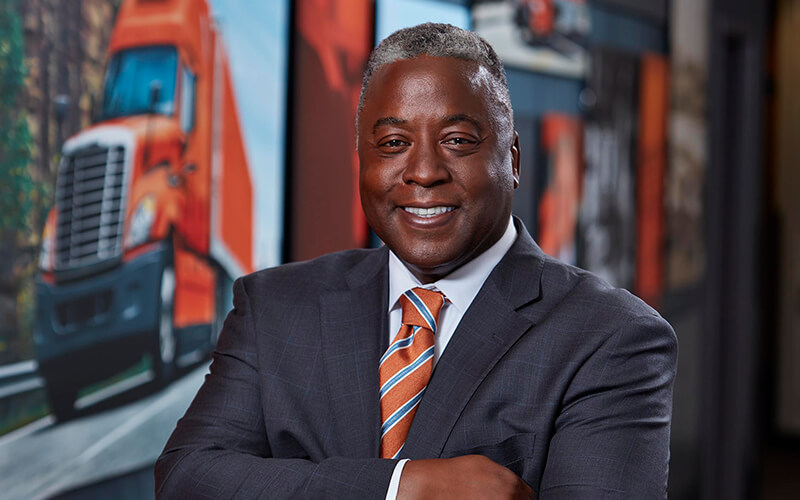Spotlight: Thom Jackson and the Black General Counsel project


By The Schneider Guy
The Black General Counsel is an organization whose goal is to see equipped and qualified Black lawyers better represented in in-house legal roles, especially as general counsel or chief legal officers in major companies. Today, Black general counsel make up more than five percent of all general counsel in Fortune 1000® companies. These milestones are tracked by the Black General Counsel 2025 initiative.
In light of this development, reporters at Bloomberg Law reached out to more than 50 Black legal chiefs whose companies were part of the Fortune 1000® in the last two years. One such individual was Schneider’s Executive Vice President and General Counsel, Thom Jackson.
Readers can find the full Bloomberg Law blog as well as an audio recording by visiting the original article.
Thom Jackson's Q&A with Bloomberg Law
The following is a transcript of Thom’s Q&A with Bloomberg Law, in which he shared the some of his key insights:
What’s the best leadership advice you’ve gotten from mentors or others?
“Early in my career, I met a law partner who gave me two pieces of advice—stay humble and stay hungry. By humble, he meant that with any success that you may achieve during your career, you should acknowledge that your success can rarely be attributable solely to any individual’s achievement. It’s about the team."
"A true leader always deflects or shares credit where credit is due. By hungry, he meant that you cannot be complacent. You have to bring your “A” game every day and to every matter, exude confidence not arrogance and be prepared to take calculated risks in your career because doing those things will bring recognition and distinguish you from others.”
What advice would you give lawyers who want to go in-house?
“Whether it’s about timing, practice area and opportunity, compensation, control, or permanency, there are any number of factors to consider. Lawyers should ask themselves whether they enjoy working on a wide range of legal issues and don’t want to be pressured to specialize."
"How important is perfection to them? In my experience, in-house practice is more about risk management and doing the best you can with the time allotted than delivering a perfect deliverable.”
What do you wish you knew at the beginning of your career that you know now?
“To be effective as a counselor, as an adviser, or as an influencer, it is absolutely critical to invest the time to learn the business as well as—if not better than—those who run the business. That is the advice that I impart to everyone who works with me.”
Why do you think the number of Black general counsel has been on the rise? Have you observed any changes in the past few years that have contributed to recent increases in representation?
“It may well be that companies have focused more intently on C-suite diversity amid the recent national dialogue on race and equality. Certainly, the business case for diversity is now well-settled—diverse leadership teams drive better outcomes, and the GC position is an ideal place to start because there is a deep and broad talent pool of experienced minority lawyers in nearly every industry."
"Whatever the reasons for the increase, I support and applaud the progress. Any Black GC in that 5% will tell you that it’s lonely being one of a few and how you pine for peers who look like you to connect and network with. I certainly feel that way.”
"In response to calls from shareholders, legislators, and other stakeholders for increased diversity in their boardrooms, from gender, to age, race and ethnicity, and professional background, the percentage of minorities and women on the boards of the largest public companies in the United States has also edged up in the last few years. This turnover, small by any measure, nonetheless has shone a positive light on minority executives."
"I think industry is slowly awakening to the notion that in order to attract and retain talented executives of color, it will need to visibly demonstrate a commitment and track record of doing so.”
When you’re looking to hire outside counsel, how does diversity come into play in your evaluation of law firms?
“Historically, diversity has not been a consistent or enduring factor in my evaluation of law firms. I have always ascribed to the philosophy that I don’t hire law firms; I hire lawyers. I will hire the best lawyer that I can identify whom I am convinced can and will deliver the legal outcome that best serves my client. It’s that simple. I would never compromise the likelihood of achieving my objective to achieve diversity. That’s my philosophy.”
“However, I understand the moment—and the opportunity—before us. I have always been sensitive to issues around diversity, equity, and inclusion in business. In recent months, I have become even more attuned to them."
"My criteria for evaluating outside counsel has continued to evolve and, if the number of Black general counsel is indeed growing, the opportunities to select more diverse and inclusive talent will be able to thrive in new ways for businesses like ours.”
Want to learn more about Schneider’s dedication to diversity and inclusion?
At Schneider, we believe that treating everyone with dignity and respect is vital for ongoing success. See the actions our company is taking to be more inclusive by clicking the link below.

Schneider Guy loves the "Big Orange." He's passionate about the trucking industry and connecting people to rewarding careers within it. He's been the eyes and ears of our company since our founding in 1935, and he's excited to interact with prospective and current Schneider associates through "A Slice of Orange."



